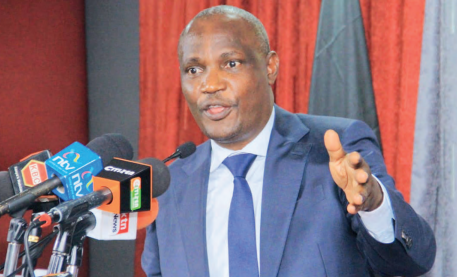
The National Treasury has hinted at
new taxes targeting professionals
undertaking private practice in the
country and landlords.
Cabinet Secretary John Mbadi said that these areas have not been paying a fair share of taxes, exposing a majority to a greater tax burden.
In the plan, the ministry will jointly with the Kenya Revenue Authority undertake new reforms aimed at facilitating the taxation of these sectors. The CS says that the withdrawal of the Finance Bill 2024 and the nullification of the Finance Act 2023 have left the government in need of broadening revenue collection measures.
“The realities of economic status the country finds itself necessarily require that to ease the tax burden on Kenyans, the government must broaden the tax base,” said Mbadi.
The cabinet secretary added that: “The reality is that even as we consider new taxes, there are a number of taxable areas that currently are not being targeted. The under-taxation can be seen in areas such as VAT, rental income, and personal income tax.”
Under taxation of rental income, for instance, the country has seen the government only collect Sh17 billion instead of projected Sh100 billion.
“For those who may not understand, we have so many professionals across the country, those who even treat you when you are sick, as private doctors, there are lawyers, there are accountants, there are all kinds of professionals, engineers, very few of them pay taxes as is required,” Mbadi pointed out.
In the tax reforms, Treasury says it is launching a comprehensive digital tax system, which aligns with Kenya’s medium-term economics that will improve visibility and efficiency in tax collection and streamline fiscal management.
Mbadi said that in consultation with President William Ruto, they have agreed on a number of reforms at the Kenya Revenue Authority, that is, having a system that can help collect taxes more efficiently and economically.
“I don’t want us to militarise tax collection. We must do it in a way that people understand that paying taxes is a responsibility. Government is the single largest buyer of goods and services. If you give them money and it is used prudent, and I want to emphasize that, it is used prudent, therefore we are able to again get it back,” said Mbadi.
In a bid to ease pressure on businesses, Treasury announced plans to lower taxes, including VAT and corporate tax, to ease pressure on businesses and promote job creation. “I mentioned that we must, in the medium term, lower taxes. We must lower the tax rates. We must lower the VAT rate.
We must try to also even reduce the corporation tax from 30 to 25 per cent,” the CS said. The personal income taxes KRA is targeting are primarily collected under the Pay-As-You-Earn (PAYE) system, which is a form of withholding tax on salaries and wages.
Employers deduct PAYE from employee salaries and remit the taxes
to the Kenya Revenue Authority
(KRA) on a monthly basis.
In 2023, the Kenya Revenue Authority (KRA) collected Sh543.2 billion from Pay-As-You-Earn (PAYE),
representing a 9.7 percent growth
compared to the previous year.

